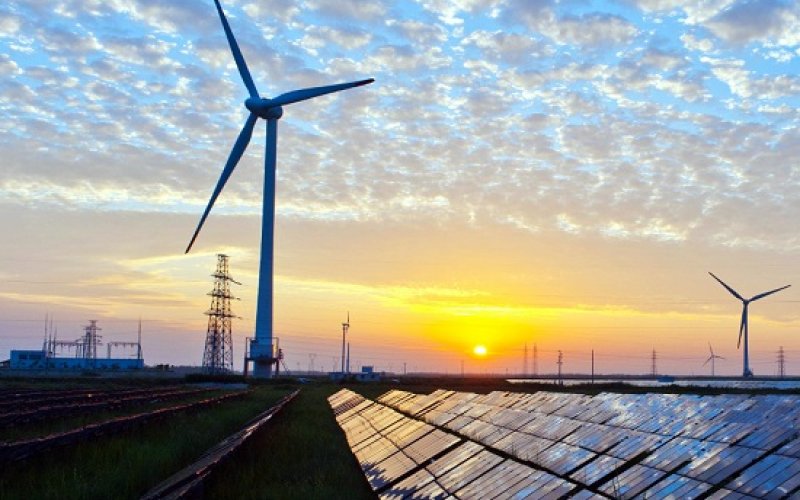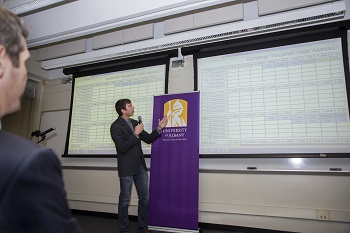UAlbany Partners on New Weather Forecasting Tool for New York Utilities

Utilities can soon use a single model to prepare for weather-induced power outages and variations in renewable energy production.
ALBANY, N.Y. (Oct. 15, 2020) – The University at Albany today announced plans to create a new weather forecasting tool that will offer real-time predictions on storm outages, electrical load and renewable energy generation, which will better equip utility companies to make important decisions on how to prepare for weather-induced power outages and variations in renewable energy production.
The new tool, a partnership between UAlbany’s Center of Excellence in Weather & Climate Analytics (COE), Electrical Distribution Design (EDD), Orange and Rockland Utilities, and Central Hudson Gas & Electric, will produce a customizable dashboard using a combination of New York State Mesonet data and Integrated System Models (ISMs)
It will be created in two phases over the next 24 months through $1.7 million in external funding, including a $1.2 million investment from the New York State Energy Research and Development Authority (NYSERDA).
“New York is especially vulnerable to extreme weather and state utilities often use a number of different forecast projections and models to assist with operational and financial decision-making,” said Chris Thorncroft, director of UAlbany’s Atmospheric Sciences Research Center, along with the NYS Mesonet and COE. “We are combining resources with our partners to instead create a single model that incorporates all weather data, along with other measurements, on a customizable dashboard. This will not only greatly simplify the process, but also make it much more efficient.”
“Governor Cuomo’s steadfast commitment to forward thinking technologies has advanced this project, enabling the state’s utilities to harness the New York State Mesonet data to track real-time activities for both storms and renewable energy,” said Doreen M. Harris, acting president and CEO of NYSERDA. “Severe weather events have become our norm as a result of climate change and having live data at our fingertips will be invaluable in helping us improve our statewide preparedness and resiliency in even the most challenging situations.”
“Central Hudson is proud to continue its long-standing relationship with UAlbany’s Center of Excellence in Weather & Climate Analytics, one of the nation’s leading atmospheric sciences programs,” Charles A. Freni, president and CEO of Central Hudson said. “Our service area is experiencing tremendous growth in solar generation, and a state-of-the-art predictive system will help us improve our ability to manage the ebbs and flows of intermittent, renewable energy sources while also helping us better prepare for severe weather. This means we can provide a higher level of service and response to our customers every single day.”
Smart Weather Data
 |
|
COE's Nick Bassill unveils a customized dashboard for school districts statewide to help with weather-related closing decisions. (Photo by Brian Busher)
|
The NYS Mesonet, headquartered at UAlbany, includes 126 standard weather observation stations across the state. The network provides an array of real-time weather measurements that can help with situational awareness for both storms and renewables generation.
Along with NYS Mesonet data, this new forecasting tool will leverage other publicly-available weather data sources, including sensors that are being installed now through the project at large New York solar farms.
Orange and Rockland Utilities and Central Hudson Gas & Electric are also providing their own data from previously existing ISMs, which will be combined for the first time through this project. The dashboard will initially be customized for them, but can expand to assist other utilities statewide, according to Nick Bassill, director of research and development at UAlbany’s COE.
“This project represents the next leap in weather analysis and visualization, while also incorporating the knowledge we’ve already learned from previous projects,” Bassill said. “The really exciting thing for me is demonstrating that utilities can improve their expected impacts from weather by cooperating with one another.”
UAlbany's COE is New York’s entrepreneurial hub for a network of over 120 weather and climate faculty, researchers and research staff. Together, these experts are advancing smart weather and climate research applications within a variety of industries. This latest product builds on similar concept dashboards that the COE created for Capital Region BOCES, SUNY and the Department of Transportation, as well as a statewide utility dashboard to use during COVID-19.
Along with the COE and NYS Mesonet, researchers at UAlbany’s xCITE (ExTREME Collaboration, Innovation, & TEchnology) laboratory, a state-of-the-art data and visual analytics center, are also offering machine learning expertise to help build the dashboard.




